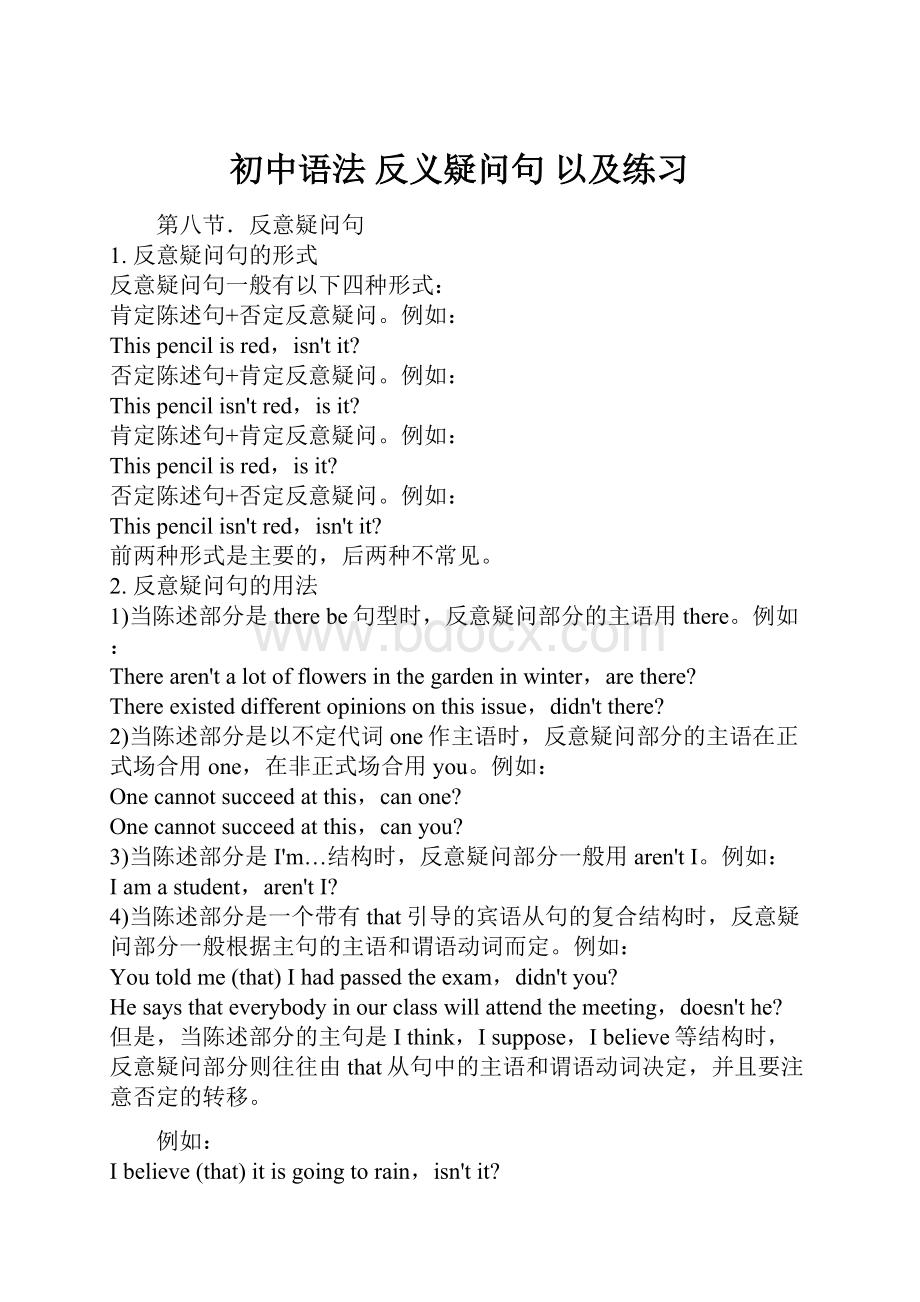初中语法 反义疑问句 以及练习.docx
《初中语法 反义疑问句 以及练习.docx》由会员分享,可在线阅读,更多相关《初中语法 反义疑问句 以及练习.docx(19页珍藏版)》请在冰豆网上搜索。

初中语法反义疑问句以及练习
第八节.反意疑问句
1.反意疑问句的形式
反意疑问句一般有以下四种形式:
肯定陈述句+否定反意疑问。
例如:
Thispencilisred,isn'tit?
否定陈述句+肯定反意疑问。
例如:
Thispencilisn'tred,isit?
肯定陈述句+肯定反意疑问。
例如:
Thispencilisred,isit?
否定陈述句+否定反意疑问。
例如:
Thispencilisn'tred,isn'tit?
前两种形式是主要的,后两种不常见。
2.反意疑问句的用法
1)当陈述部分是therebe句型时,反意疑问部分的主语用there。
例如:
Therearen'talotofflowersinthegardeninwinter,arethere?
Thereexisteddifferentopinionsonthisissue,didn'tthere?
2)当陈述部分是以不定代词one作主语时,反意疑问部分的主语在正式场合用one,在非正式场合用you。
例如:
Onecannotsucceedatthis,canone?
Onecannotsucceedatthis,canyou?
3)当陈述部分是I'm…结构时,反意疑问部分一般用aren'tI。
例如:
Iamastudent,aren'tI?
4)当陈述部分是一个带有that引导的宾语从句的复合结构时,反意疑问部分一般根据主句的主语和谓语动词而定。
例如:
Youtoldme(that)Ihadpassedtheexam,didn'tyou?
Hesaysthateverybodyinourclasswillattendthemeeting,doesn'the?
但是,当陈述部分的主句是Ithink,Isuppose,Ibelieve等结构时,反意疑问部分则往往由that从句中的主语和谓语动词决定,并且要注意否定的转移。
例如:
Ibelieve(that)itisgoingtorain,isn'tit?
Idon'tthink(that)hewillcome,willhe?
5)当陈述部分的谓语动词是have时,反意疑问部分要根据have的意义及形式而定。
a.当have表示“所有”含义时,反意疑问可以用have形式,也可以用do形式。
例如:
Hehasabookinhishand,hasn'the?
Hehasabookinhishand,doesn'the?
b.当陈述部分的动词是have的否定形式时,反意疑问部分是用have形式还是用do形式,取决于陈述部分的动词形式。
例如:
Youhaven'tacar,haveyou?
Youdon'thaveanymoneywithyou,doyou?
c.当have不表示“所有”含义而表示其他含义时,反意疑问句则必须用do的形式。
例如:
Wehadagoodtimeinthevacation,didn'twe?
Hehashisbreakfastatseveneveryday,doesn'the?
Youhavetogetupearlytomorrow,don'tyou?
6)当陈述部分带有never,nothing,nowhere,seldom,hardly,rarely,few,little等否定词或半否定词时,反意疑问部分的动词用肯定形式。
例如:
Thesummitmeetingnevertookplace,didit?
Youcanhardlybelievewhathesaid,canyou?
Thereislittleinkinthebottle,isthere?
Fewpeopleknowthisplace,dothey?
7)当陈述部分的谓语动词是带有un-,in-,im-,dis-等否定前缀的动词,则仍然把陈述部分看作肯定句,那么反意疑问部分用否定形式。
例如:
Heisimpolitetotheteacher,isn'the?
Hedistrustedanybodyaroundhim,didn'the?
8)当陈述部分带有情态动词oughtto时,反意疑问部分在英式英语中用oughtto形式,在美式英语中用should形式。
例如:
Yououghttoseethenewpicture,shouldn'tyou?
Teachersoughttobehonoured,oughtn'tthey?
9)当陈述部分带有情态动词usedto时,反意疑问部分可以用usedto形式,也可以用did形式。
例如:
Sheusedtoliveabroad,usedn'tshe?
Thereusedtobeanewsstandinthecornerofthestreet,didn'tthere?
当陈述部分带有情态动词must时,反意疑问部分需视must的含义而定。
a.当must表示“命令或强制”时,反意疑问部分用mustn't。
例如:
Youmustdoitbyyourself,mustn'tyou?
b.当must表示“有必要”时,反意疑问部分用needn't。
例如:
Youmustseehimtonight,needn'tyou?
c.当must表示“一定”或“想必”等推测意义时,反意疑问部分不用mustn't,而要根据must后的动词形式而定。
例如:
Hemustbecrazytodoso,isn'the?
Shemusthavebeenthereforalongtime,hasn'tshe?
Theymusthavestayedathomelastnight,didn'tthey?
10)当陈述部分带有need时,反意疑问部分需视need的含义而定。
如果need用作情态动词,则反意疑问部分用need形式;如果need用作实义动词,表示“需要”,则反意疑问部分用do形式。
例如:
Youneedn'tgothere,needyou?
Sheneedstogothere,doesn'tshe?
Plantsneedsuntogrow,don'tthey?
11)当陈述部分带有I'dbetter或I'drather时,反意疑问部分用hadn't或wouldn't。
例如:
You'dbetterfinishthetaskbeforetomorrow,hadn'tyou?
He'dratherstaywithus,wouldn'the?
12)当陈述部分是祈使句时,反意疑问部分一般用willyou,won'tyou,wouldyou。
例如:
Don'tbetoolate,willyou?
Closethedoor,won'tyou?
Comehere,willyou?
Openyourbooks,wouldyou?
13)陈述部分是以Let's开头的祈使句时,反意疑问部分用shallwe;若是以Letus开头的祈使句,反意疑问部分则用willyou。
例如:
Let'shaveapartytonight,shallwe?
Letushavealookatyourpictures,willyou?
注意,如果祈使句是否定形式,那么反意疑问句只能用willyou。
例如:
Don'tforgettobringyournotebooksheretomorrow,willyou?
反意疑问句练习
1. You’dratherwatchTVthisevening,______?
a.isn’titb.hadn’tyouc.wouldn’tyoud.won’tyou
2. Isupposeyou’renotgoingtoday,______?
a.areyoub.doyouc.don’tyoud.aren’tyou
3. Iwishtoshakehandswithyou,______?
a.shallb.mayIc.doId.willI
4. Threehoursoughttobeenoughtime,______?
a.oughtn’tthreehoursb.didn’ttheyc.shouldn’titd.shouldn’tthreehours
5. Theyhavetostudyalot,______?
a.don’ttheyb.haven’ttheyc.didtheyd.hadn’tthey
6. Whenthecarcrashed,yourbrotherescapedbeinghurt,______?
a.didn’theb.didhec.diditd.didn’tit
7. I'msuredirty,______?
a.amIb.isn’tIc.aren’tId.amnotI
8. Youseemtobedissatisfiedwithyourpresentpost.Idon’tthinkyoujudgedyourabilityobjectivelywhenyouappliedforit,______you?
a.dob.didc.don’td.didn’t
9. That’sthesortofthebookyouwant,______?
a.isitd.isn’tthatc.isthatd.isn’tit
10. Allthesedictionariesareagreathelptoyou,______?
a.aretheyb.aren’tthey
c.areallthesedictionariesd.aren’tallthesedictionaries
11. Themoviethatwesawlastweekwasquiteinteresting,______?
a.wasn’titb.wasitc.didn’twed.weren’twe
12. Tomhasbeenwritinglettersallafternoon,butheshouldhavefinishedthembynow,
______?
a.hasn’theb.hashec.shouldn’thed.didn’tyou
13. DavidtoldmethatyouwouldtakeatriptoAmerica,______?
a.wouldyoub.wouldn’tyouc.didyoud.didn’tyou
14. Thereappearedtobenobetterway,_______?
a.wasthereb.weretherec.didthered.didn’tthere
15. YouhassometroublefindingwhereIlive,______?
a.didn’tyoub.hadn’tyouc.doId.don’tI
16. Hehashishaircuteverymonth,______?
a.hasheb.hasn’thec.doeshed.doesn’the
17. Yourfriendneedstocomeearlier,______?
a.doesheb.doesn’thec.needhed.needn’the
18. Thelittleboydarenotgotochurch,______?
a.dareheb.daren’thec.doeshed.doesn’the
19. Susan’dhaveworkedabroadifshe’dhadthechance,______?
a.hassheb.hadn’tshec.wouldshed.wouldn’tshe
20. Everyone’shavingagoodtime,______?
a.isheb.isn’teveryonec.doeshed.aren’tthey
21. Anyonecanjointheclub,______?
a.cananyoneb.can’tanyonec.can’ttheyd.canthey
22. Tellmehowtooperatetheelectroniccomputer,______?
a.willyoub.shan’tyouc.doyoud.don’tyou
23. MagaretscarcelycomestovisityouonChristmasDay,______?
a.doesn’tsheb.doesshec.doyoud.don’tyou
24. Let’slistentotheradioprogramthattheteachermentioned,______?
a.doweb.don’twec.shallwed.shan’twe
25. Youthinkyou’refunny,______?
a.didn’tyoub.areyouc.don’tyoud.doyou
26. Janetusedtotakepartinlaborinthatvillage,______?
a.usedsheb.didshec.didn’tshed.shouldshe
27. Whatbeautifulweather,______?
a.isitb.isn’titc.won’titd.doesn’tit
28. HeoughttogotoKwangchowbyplane,______?
a.shouldheb.shouldn’thec.wouldhed.wouldn’the
29. Weneverdaredtoaskhimaquestion,______?
a.didweb.didn’twec.daredwed.daren’twe
30. Nobodywillbelievehowdifficulthisworkhasbeen______?
a.willheb.won’tnobodyc.willtheyd.won’tthey
31. Youmusthavemadethemistake,______?
a.mustn’tyoub.haven’tyouc.didn’tyoud.hadn’tyou
32. Learninghowtorepaircomputerstakesalongtime,______?
a.isn’titb.aren’ttheyc.doesn’titd.don’tthey
33. Jackhascoffeewithbreakfast,______?
a.hasn’tJackb.hasn’thec.doesn’tJackd.doesn’the
34. Theymusthavestayedathotellastnight,______?
a.mustn’ttheyb.haven’ttheyc.didn’ttheyd.hadn’tthey
35. Thereisn’tanythingwrongwiththeradio,______?
a.isthereb.isitc.doesitd.doesthere
36. Youmustbehungry,______?
a.mustyoub.mustn’tyouc.areyoud.aren’tyou
37. Let’sdotheexercisesbyourselves,______?
a.shallweb.shan’twec.willyoud.willwe
38. Herdaughterhadthecarpetsandcurtainscleaned,______?
a.hadsheb.hadn’tshec.didn’tshed.didn’therdaughter
39. Theteacherhadatalkwithyou,______?
a.hasyoub.hadn’tshec.didshed.didn’tshe
40. Something’llhavetobedoneabouttheairpollution,______?
a.won’titb.willitc.hasitd.doesit
反意疑问句练习答案
1
C
19
D
37
A
2
A
20
D
38
C
3
B
21
C
39
D
4
C
22
A
40
A
5
A
23
B
41
6
A
24
C
42
7
C
25
D
43
8
B
26
C
44
9
D
27
B
45
10
B
28
B
46
11
A
29
A
47
12
C
30
C
48
13
B
31
B
49
14
D
32
C
50
15
A
33
D
51
16
D
34
C
52
17
B
35
A
53
18
A
36
D
54
句型转换
解析同义型、条件型句型转换
句型转换是要求学生根据所给的句型,按要求或提示完成考题,考查的是学生对句子结构的构成、变化等方面的知识以及对此类知识的运用能力。
该题型首先给出一个完整的句子,再给出一个含有几个空白处的句子,根据不同的要求填入适当的词完成句型转换。
句型转换涉及到语法知识的各个方面,在做这种题时,应注意时态、语态、人称、数的变化,特殊疑问词的用法,及助动词的用法等。
句型转换考题虽然包括各种句式,但通常以两种形式进行考查:
同义型句型转换和条件型句型转换。
一、同义型句型转换
同义型句型转换即是用另一种方式来表述与原句相同的句意,也称作同义句转换,主要考查学生对句型及词汇的掌握情况。
【真题引导1】
Ipreferwalkingtheretogoingbybus.
Iprefertowalkthere___bybus.
【答案与解析】
该题考查prefer...to...与prefer...ratherthan...这两个句型的转换。
前者后接动词时用V.+ing形式,而后者则接不定式,并且ratherthan后的不定式符号要省略。
答案:
ratherthango。
【真题引导2】
IttookMarytwoweekstopreparefortheexam.
Mary____twoweeks___fortheexam.
【答案与解析】
该题考查的是表示“花费时间做某事”的两个句型的转换,take常用的句型是:
ittakes+时间+todo...;而spend却是:
sb+spend+时间+(in)doing...。
答案:
spent,inpreparing。
【真题引导3】
Ialwaysgetupbeforesixo'clockinmyschooldays.
I__getup______sixo'clockinmyschooldays.
【答案与解析】
根据原句的意思,只有在第二句的两个空白处分别填入never与after,这样才能表达出与第一句相同的含义。
这里要注意always的否定副词是never。
答案:
never,after。
【真题引导4】
Thechildrenaretootiredtowalkfarther.
Theyare_____tired____they____walkfarther.
【答案与解析】
含有too...to的简单句常和so...that引导的复合句互相转换。
但是too...to的本身是否定意义,so...that从句要改为否定。
答案:
so,that,can't。
【真题引导5】
Thegirlleftherhomeafewdaysago,shehasnotcomebackyet.
Thegirlhas____fromherhomeforafewdays.
【答案与解析】
第一句意思为“女孩几天前离开家,她现在还未回来”。
根据句意